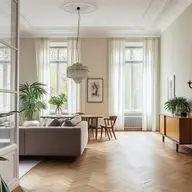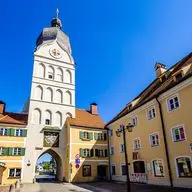
- 7 min read
Guide for owners: Redevelopment and preservation areas
&w=1920&q=75)
If you want to buy or sell a multi-family house, you have to comply with some building laws which are particularly relevant for investors. In addition to the current legal situation, the possible development of municipal regulations should also be taken into account when making an investment decision.
For even if the purchase of a property was made some time ago, the local municipality can enact bylaws on the basis of the Building Code (BauGB) that restrict owners or investors in their freedom of disposition with regard to their property and, if necessary, impose on them additional obligations on them.
Table of Content
Municipal bylaws - an important aspect for your real estate investment
Redevelopment statutes - under what circumstances are they enacted?
Property in a redevelopment area - what does this mean for owners?
Tax benefits for refurbishment - what depreciation is possible?
Preservation statutes - under what conditions are they adopted?
Property in a conservation area - what are the requirements?
Trend in major German cities - how much influence do municipalities have?
Municipal bylaws - an important aspect for your real estate investment
We would like to introduce two of these regulation options to you here: the redevelopment statutes (according to § 142 BauGB), from which the term "redevelopment area" has developed and become established, and the preservation statutes (according to § 172 BauGB), also called "preservation area" or "milieu protection area".
what does it mean for you as an owner if one of your properties is located in a redevelopment or preservation area? What rights and obligations does this entail? And do municipal bylaws have an impact on the value of your property and its marketability?
On the following pages we will go into these topics in more detail and give you recommendations recommendations. Use them as a basis for individual advice from our experienced advisors, who will be happy to clarify your specific questions.
Redevelopment statutes - under what circumstances are they enacted?
The built structure of a city is subject to constant change. If the urban condition of an area of an area no longer meets current standards, the respective municipality can issue a formal redevelopment statute - and impose certain redevelopment measures on property owners to improve living and working conditions or to preserve the urban heritage.
Prerequisites for this are urban Grievancesthe prerequisite for this is urban deplorable conditions, e.g. serious effects on healthy living and working conditions, safety or the functional fulfilment of the area. For this purpose, conditions such as lighting, sunlight and ventilation of the dwellings and workplaces and their structural condition, the accessibility of the properties, effects of noise, pollution and vibrations as well as the overall energy efficiency of the existing development are assessed.
Notwithstanding the fact that different standards are applied to this assessment - depending on building conditions and developments - in different municipalities, urban conversion measures are assessed by several government bodies and are thus eligible for Grants from the federal government. Many redevelopment areas also generate a high regional benefit through upgrading - from which you, as the owner, also profit in the end.
Property in a redevelopment area - what does this mean for owners?
If a district is declared a redevelopment area, you as a property owner should be prepared for certain consequences, including financial ones. For example, the municipality is entitled, on the basis of the redevelopment measures, to Increase in the value of the property of the property as a result of the redevelopment measures.
The payment of this compulsory levy in accordance with § 154 BauGB is determined by the municipality and can extend over several years if necessary. In fact, this means that you as the owner have to participate in the preparation and Implementation of the redevelopment and implementation of the redevelopment.
This is to ensure that the direct redevelopment-related benefits for property owners in the form of land value increases do not remain without consideration and that enrichment at the expense of the municipality is prevented.
Sales must be approved in writing by the municipality
Owners who wish to market their property in the course of the redevelopment can only do so at the value unaffected by redevelopment, according to Section 153 (1) BauGB, and thus cannot escape the costs. In addition, property and land sales must be approved in writing by the municipality.
This also applies to the creation of rights encumbering the property, such as land charges, mortgages, easements or usufructuary rights. This is to enable the municipality to prevent financial encumbrances on the property that do not serve structural investments on the property, and to avoid the Payment of the equalisation payment of the equalisation contribution.
Last but not least is the influence on the Rentability of the real estate as it is not uncommon for the construction work to take several years.
Tax benefits for refurbishment - what depreciation is possible?
For the modernisation and repair of properties located in so-called redevelopment areas, the following are still available today increased depreciation possibilities - even though many tax advantages for real estate investors were abolished with the abolition of declining balance depreciation for new buildings on 1 January 2006.
For construction measures in a formally defined redevelopment area or an urban development area, the urban development area increased depreciation can be claimed under §7h EStG as follows: eight years up to 9% and four years up to 7% (whereas the other average depreciation rate is 2%). The basis of assessment for this is the production costs of the beneficiary construction measure.
the increased depreciation can only be claimed, however, if the competent municipal authority certifies that the requirements for the respective property are met. If this certificate is not available or if the object, e.g. a condominium, is not specifically named in the certificate, the increased depreciation cannot be claimed.
Preservation statutes - under what conditions are they adopted?
In areas whose the urban character and design of which is to be in areas whose urban character and design are to be preserved, municipalities can adopt a change prohibition by means of a statute. Within the framework of such a preservation statute, property owners must apply for and obtain official approval for the construction of new buildings, the change of use or the demolition of buildings.
The purpose of defining such areas is, among other things, to protect the townscape and landscape and to preserve buildings of urban significance. A special form of preservation statute is the so-called milieu protection statute, which aims to preserve the composition of the residential population.
The preservation statutes can also be referred to as "municipal monument protection municipalities and communities can use them to protect neighbourhoods or streets from undesirable or detrimental changes, independently of the regular protection of historical monuments. In addition, they can ensure that new buildings blend in better with their surroundings than would be possible under § 34 BauGB (insertion requirement) alone, for example through the use of a gable roof, window formats or façade colour. All that is needed for this is a well-founded justification in the bylaws
Property in a conservation area - what are the requirements?
If an owner wants to make changes to his or her property or building, the conservation objectives of the respective bylaws determine whether these are permissible. This Approval requirement is independent of any exemption from approval under the building regulations of the respective Land.
Consequently, restrictions for property owners in a conservation area with regard to redevelopment, sale and letting cannot be ruled out. The competent authority may refuse building measures or impose conditions Conditions conditions. The latter, in turn, can consist in limiting the scope of modernisation or prohibiting floor plan changes such as the merging of flats.
Likewise, in addition to the division of apartment buildings into individual condominiums, flat conversions or energy-related renovation measures with the aim of increasing the rent can also be prohibited. Also Conversion and extension measures (e.g. balconies) which have an impact on the rent are also contrary to the objective of a preservation statute and are therefore generally rejected.
Trend in major German cities - how much influence do municipalities have?
In particular fast-growing cities are often the focus of investors due to ongoing gentrification and rising rents and purchase prices. This means that the increase in attractiveness in individual city districts is attracting an increasingly affluent public, while lower-income population groups are moving away - so that a cultural mix is usually no longer given.
Municipalities are increasingly trying to counter this trend with corresponding statutes to counteract this trend - on the one hand to strengthen the attractiveness of the locations and on the other hand to prevent existing tenant structures from being displaced by owners, for example by dividing an apartment building into condominiums.
In Frankfurt, for example, in addition to small-scale conservation areas, much larger inner-city areas are currently in the process of being redeveloped, whereas in eastern German cities such as Leipzig or Dresden, redevelopment and conservation areas tend to be dissolved and hardly play a role any more. Nevertheless be assumednevertheless, it can be assumed that municipalities throughout Germany will increasingly designate these areas in the future in order to secure socio-cultural diversity in the regions. The possible consequences for you as an owner should therefore always be kept in mind.
You may also be interested in
 Floor plan: Everything important about planning, creation, and interpretation
Floor plan: Everything important about planning, creation, and interpretation Sustainability & ESG in Real Estate: What You need to know
Sustainability & ESG in Real Estate: What You need to know- 3 min.
- 30.04.2025
 Erding real estate market 2026: Market overview and price developments
Erding real estate market 2026: Market overview and price developments Freising real estate market 2026: Trends, developments and price forecasts
Freising real estate market 2026: Trends, developments and price forecasts Positive news from the residential real estate market
Positive news from the residential real estate market&w=1920&q=75) Future-proof property 2026
Future-proof property 2026- 5 min.
- 23.01.2026
 Individual renovation roadmap
Individual renovation roadmap Engel & Völkers cooperates with service provider Enter: Energy advice for homeowners in Germany
Engel & Völkers cooperates with service provider Enter: Energy advice for homeowners in Germany
Contact
Contact your personal advisor


Engel & Völkers Germany
Vancouverstraße 2a
20457 Hamburg, Germany
Tel: +49 40 361310